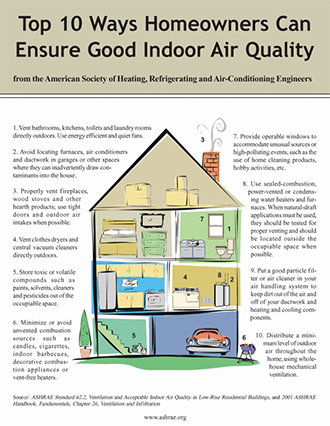
What are the Benefits of Better Indoor Air Quality?
Many people do not think about indoor air quality or the effect that it has on their health and well-being. While it is commonly understood that air pollution is harmful, most think of air pollution in terms of outdoor air. Since the average American spends about 90 percent of their time indoors, however, indoor air quality can have a huge impact. To look at it from a positive perspective, the following are several benefits provided by good indoor air quality.
- Better Breathing - If indoor air quality is good, the amount of oxygen that the body receives with each breathe is higher and the quantity of contaminants in the air is lower. These factors can make it easier to breathe, which puts less strain on the lungs, heart, and body. Breathing easier and being exposed to fewer pollutants can make building inhabitants feel more energetic and can help to prevent against respiratory issues later.
- Better Sleep Quality - Breathing rates change throughout the sleep cycle, so air quality in the home is at least as important while sleeping as it is while awake. Volatile Organic Compounds in the air and reduced oxygen percentages can interrupt sleep cycles and have a negative impact on the quality of sleep. Good air quality can help to promote a good night’s sleep and can help to protect against the development of sleep-related breathing conditions such as sleep apnea.
- Improved Moisture Control - Proper moisture control can prevent the growth of mold and bacteria and increase comfort levels. Air that is too dry can cause skin irritation and nosebleeds, while air that is too moist can cause stuffiness and can damage home furnishings and structures. The ideal relative humidity for homes is between 45% and 55%, though this may vary between the seasons in different areas.
- Reduction of Allergens - Allergic reactions to airborne allergens can include sneezing, coughing, congestion, irritated eyes, and other physical problems. Common allergens in indoor air include dust, dust mites, pollen, mold spores, animal dander, and cockroach debris. Having a system in place to ensure good indoor air quality will mitigate the quantities of these allergens in the air, helping to reduce allergy symptoms for building inhabitants.
- Reduced Energy Costs - When proper steps are taken to improve indoor air quality, the strain on the home or building’s heat and air conditioning units is inevitably reduced. Since the units do not have to work as hard to cool or heat the air, less energy is used and the systems are likely last longer. This can save home and building owners money both in the short term and long term.
Improving Indoor Air Quality
Ventilation is one of the most important considerations for good indoor air quality. A high quality ventilation system such as an ERV or HRV can help to ensure that air quality is optimized by continuously removing stale indoor air and replacing it with fresh air from outdoors. A tight building envelope and good insulation are also required to optimize the function of an ERV or HRV and to promote the best air quality.

